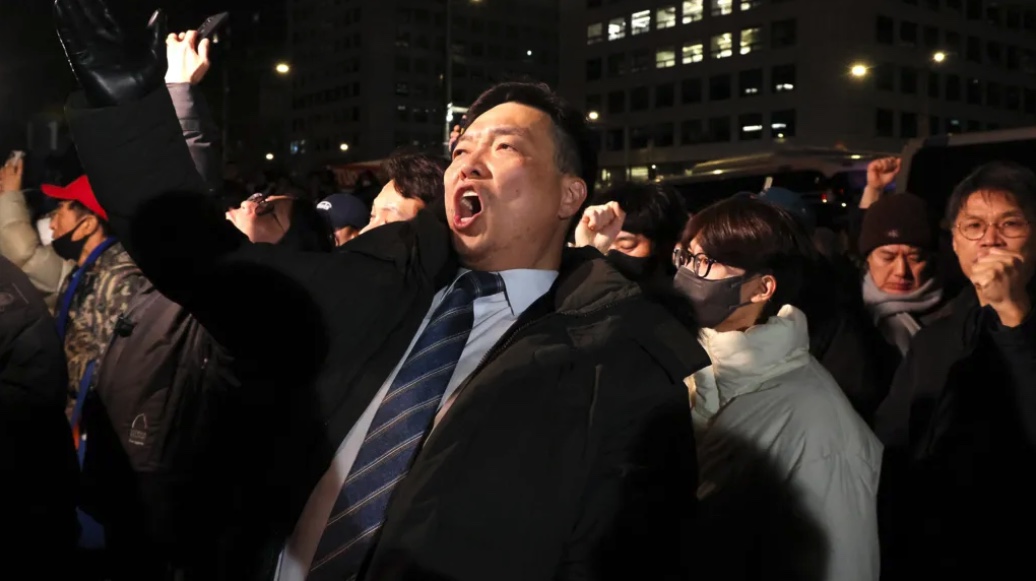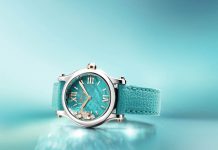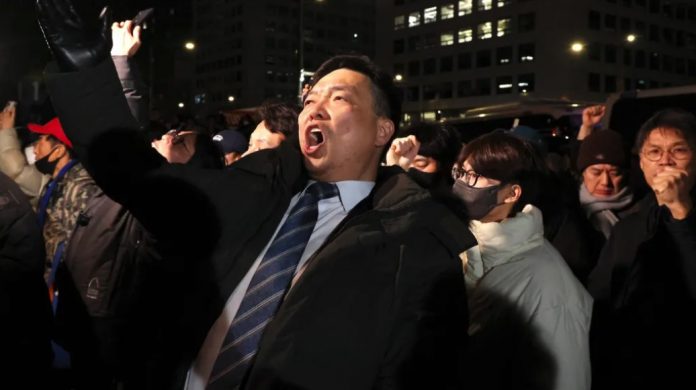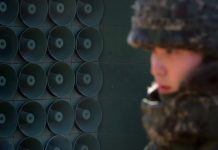กลุ่มผู้ชุมนุมเฉลิมฉลองอย่างล้นหลามหน้าอาคารรัฐสภาเกาหลีใต้ในเช้าวันพุธ หลังประธานาธิบดี ยุน ซอกยอล ตัดสินใจถอนคำสั่งกฎอัยการศึกและสั่งถอนกำลังทหารอย่างกะทันหัน
ก่อนหน้านี้ ยุนได้สร้างความตกตะลึงด้วยการประกาศใช้กฎอัยการศึกผ่านการถ่ายทอดสดทางโทรทัศน์ในช่วงดึก โดยอ้างว่าเป็นการป้องกันประเทศจาก “กลุ่มคอมมิวนิสต์เกาหลีเหนือ” และ “กำจัดกลุ่มต่อต้านรัฐ”
คำสั่งดังกล่าวสร้างความโกลาหลทันที มีผู้ประท้วงนับพันคนรวมตัวที่หน้ารัฐสภา ขณะที่สมาชิกรัฐสภาหลายคนพยายามหลีกเลี่ยงแนวกั้นของเจ้าหน้าที่ตำรวจ บางคนถึงขั้นปีนกำแพงเพื่อเข้าไปลงมติล้มเลิกคำสั่ง
แม้กองทัพจะประกาศว่าจะคงกำลังไว้จนกว่าประธานาธิบดีจะสั่งถอน แต่ในช่วงเช้ามืด ยุนได้ประกาศพลิกกลับคำสั่งและสั่งยกเลิกกฎอัยการศึก
“เมื่อครู่รัฐสภาได้เรียกร้องให้ยกเลิกสถานการณ์ฉุกเฉิน เราจึงได้สั่งถอนกำลังทหารที่ปฏิบัติการภายใต้กฎอัยการศึก” ยุนกล่าวในการแถลงทางโทรทัศน์เวลาประมาณ 04:30 น. ตามเวลาท้องถิ่น
“เราจะปฏิบัติตามคำร้องขอของรัฐสภาและยกเลิกกฎอัยการศึกผ่านการประชุมคณะรัฐมนตรี”
การตัดสินใจดังกล่าวสร้างความยินดีให้กับผู้ชุมนุมที่อดทนต่อสภาพอากาศหนาวเย็นเพื่อจับตาสถานการณ์ โดยกลุ่มผู้ประท้วงส่งเสียงเฮลั่นและตะโกนว่า “เราชนะแล้ว!” ขณะบางคนตีเครื่องดนตรีประกอบบรรยากาศ

ความหมายของกฎอัยการศึก
กฎอัยการศึกหมายถึงการปกครองโดยทหารในภาวะฉุกเฉิน ซึ่งอาจรวมถึงการระงับสิทธิพลเมืองปกติ
เกาหลีใต้ไม่ได้ใช้มาตรการนี้เลยนับตั้งแต่กลับเข้าสู่ระบอบประชาธิปไตยในปี 1987 โดยครั้งสุดท้ายที่บังคับใช้คือปี 1979 หลังการลอบสังหาร พัค จุงฮี ผู้นำเผด็จการในขณะนั้น
สถานการณ์ที่นำไปสู่คำสั่ง
รัฐบาลของยุนต้องเผชิญแรงกดดันอย่างหนักนับตั้งแต่เดือนเมษายนที่ผ่านมา เมื่อพรรคฝ่ายค้านได้รับชัยชนะอย่างถล่มทลายในศึกเลือกตั้งทั่วไป ทำให้รัฐบาลไม่มีอำนาจเพียงพอในการผลักดันร่างกฎหมายใด ๆ และต้องคอยยับยั้งกฎหมายที่ฝ่ายค้านเสนอแทน
นอกจากนี้ ยุนยังเผชิญกับข้อกล่าวหาคอร์รัปชันหลายประเด็น รวมถึงกรณีที่ภรรยาของเขาได้รับกระเป๋า Dior เป็นของขวัญ และคดีการปั่นหุ้น
สัปดาห์นี้ พรรคฝ่ายค้านเสนอให้ตัดงบประมาณสำคัญของรัฐบาลยุน ซึ่งไม่สามารถใช้สิทธิยับยั้งได้ พร้อมทั้งเคลื่อนไหวเพื่อถอดถอนรัฐมนตรีและเจ้าหน้าที่ระดับสูงหลายคนที่ล้มเหลวในการสอบสวนกรณีเกี่ยวข้องกับภรรยาของเขา
ในคำประกาศใช้กฎอัยการศึก ยุนอ้างว่าต้องการปกป้องประเทศจากภัยคุกคามของเกาหลีเหนือ แต่ต่อมากลับหันมาโจมตีฝ่ายค้านว่าใช้เสียงข้างมากในรัฐสภาเพื่อทำลายรัฐบาลของเขา
ปฏิกิริยาจากต่างประเทศ
คำประกาศของยุนสร้างความกังวลในระดับนานาชาติ โฆษกกระทรวงการต่างประเทศสหรัฐฯ ระบุว่าความสัมพันธ์พันธมิตรระหว่างเกาหลีใต้และสหรัฐฯ ยังคง “แน่นแฟ้น” แต่ย้ำว่ากำลังจับตาสถานการณ์อย่างใกล้ชิด
ขณะที่โฆษกนายกรัฐมนตรีสหราชอาณาจักร เซอร์เคียร์ สตาร์เมอร์ กล่าวว่า รัฐบาลอังกฤษกำลังติดตามสถานการณ์อย่างใกล้ชิดเช่นกัน
Crowds celebrate as South Korean president withdraws troops

Crowds of protesters erupted with cheers outside South Korea’s parliament early on Wednesday after the country’s president dramatically withdrew a martial law order that had sparked chaotic scenes in Seoul.
In an unexpected late-night TV address President Yoon Suk Yeol had announced he was imposing military rule, saying it was needed to protect the country from “North Korea’s communist forces” and to “eliminate anti-state elements”.
The order created turmoil, drawing thousands of protesters to the gates outside the National Assembly.
Lawmakers – some scaling the parliament’s perimeter walls – evaded police lines to gather and vote down the order, but the army said it would remain until revoked by the president himself.
Then in a sudden reversal in the early hours, Yoon Suk Yeol said martial law would be lifted and troops withdrawn.
“Just a moment ago, there was a demand from the National Assembly to lift the state of emergency, and we have withdrawn the military that was deployed for martial law operations,” Yoon said in a televised address around 4:30 am [1930 GMT Tuesday].
“We will accept the National Assembly’s request and lift the martial law through the Cabinet meeting,” he added.
The U-turn saw jubilation from protesters who had braved freezing temperatures to keep vigil. Members of the crowd shouted “We won!” as one person banged a drum, AFP reported.
Martial law means rule by military authorities in a time of emergency, and can mean the suspension of normal civil rights.
It has not been imposed in South Korea since the country returned to democracy in 1987.
The last time it was used was in 1979, after the assassination of long-term military ruler Park Chung Hee during a coup.

Yoon’s government has been severely weakened since April when the opposition won a landslide in the country’s general election.
He has also been mired in several corruption scandals – including one involving the First Lady accepting a Dior bag, and another around stock manipulation.
This week, the opposition proposed slashing budgets for Yoon’s government, which is was not able to veto.
The opposition has also moved to impeach cabinet members and prosecutors, including the head of the government’s audit agency for failing to investigate the First Lady.
When he announced his shock decision to impose military rule, President Yoon initially blamed North Korea, but then hit out at the opposition, accusing them of using their majority to paralyse his government’s agenda.
Yoon’s move also caused consternation abroad. A spokesperson from the US State Department said its alliance with South Korea remained “iron-clad”.
But they added: “We are continuing to watch with grave concern, and we will continue to follow developments on the ground very closely.”
A spokesperson for UK Prime Minister Sir Keir Starmer also said its government was “monitoring the situation closely”.
By Amy Walker, BBC News

















